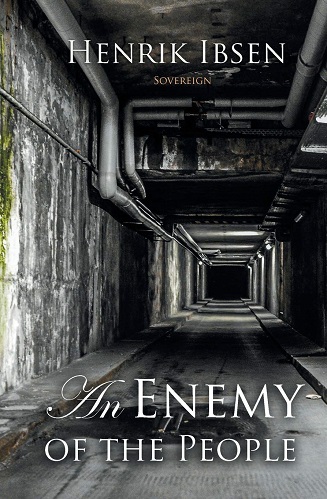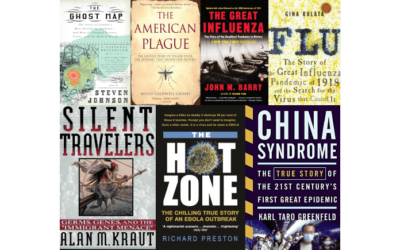Feature
‘An Enemy Of The People’: An Eye-Opening Read During The Pandemic
Known as the father of realism, Norwegian playwright Henrik Ibsen tackled contemporary social issues in realistic settings over a career that spanned 50 years, and experienced both adoration and controversy in his lifetime.
Hypocrisy and the suppression of the truth are frequent themes in Ibsen’s plays. It’s the powerful who lead, with impunity, persecuting any truth that might challenge their authority. This is best seen in Ibsen’s An Enemy Of The People.
As the world struggles with an unprecedented crisis, it’s worth reading Enemy to understand how political inaction worsened it. Ibsen was chillingly prescient about how world leaders have mismanaged the COVID-19 pandemic.
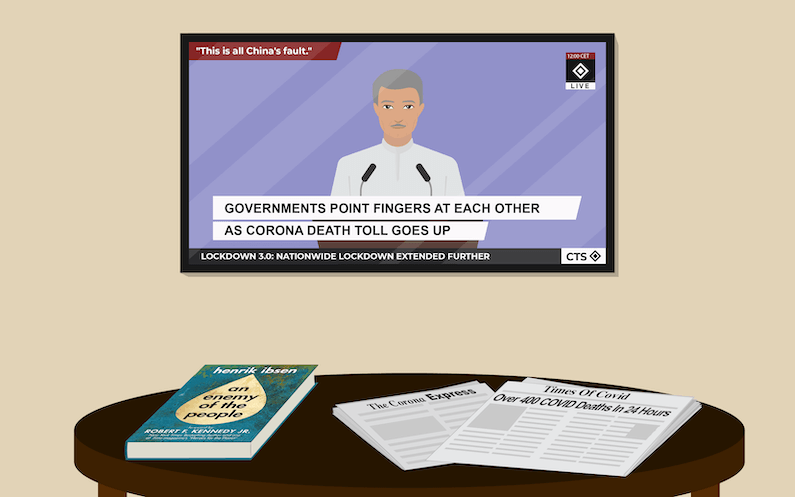
Scientific Truth Versus Political Authority
In Enemy, Dr. Thomas Stockman proposes the idea for a Baths (medical spa) which his brother, Mayor Peter, executes. The new Baths have generated employment for many and have become the town’s economic engine. When Thomas notices some visitors falling sick, he dispatches water samples to a pathology lab. On learning that the water is contaminated, he tells Peter that they need to close the Baths and reroute the water pipes. While Thomas is glad that he has saved countless lives and his hometown’s reputation, Peter informs him that he has, in fact, endangered both. Thus begins a conflict between truth and politics that, until recently, would’ve seemed surreal. Recent events, however, have made fiction look understated.
Enemy tackles the unholy liaison between power and information. What are Peter’s motives for suppressing the truth? He has several – all political. First, there’s image-consciousness flavoured with sibling rivalry since Peter was the one who insists on the placement of the water-pipes, despite Thomas’ concerns regarding their location. Peter can’t have his constituents knowing it’s his mistake that’s endangered them. Second, Peter grudges the expense of Thomas’ proposed overhaul since the Baths’ shareholders, who are absorbing its profits, won’t sponsor this, thereby placing the cost on the town. Third, there’s conservatism. Peter distrusts any challenge to the status quo, believing it must originate in personal animosity. ‘This is just another outlet for your combativeness,’ Peter tells Thomas. ‘You never could tolerate authority.’
The parallels with current affairs are chilling. In China, doctors raised concerns about COVID-19 in November 2019. Instead of taking preventive action and honouring these whistle-blowers, the Chinese Communist Party (CCP) arrested, detained, and threatened doctors and journalists. Given China’s bid for regional/global power under Xi Jinping, its reputation couldn’t risk the stain of yet another zoonosis originating, probably, from the wet-markets that host China’s vast wildlife trade.
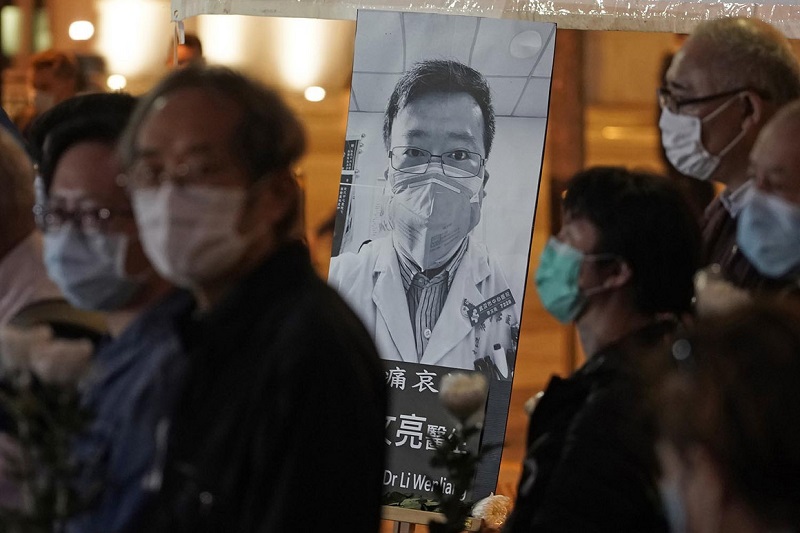
(Chinese doctor Li Wenliang, who issued a warning against Coronavirus, was initially arrested;
Image via Politico)
Truth Versus Public Perception/Image
An authoritarian regime’s primary concern is to protect, not citizens, but its own image. The CCP’s suppression of COVID-19 whistle-blowers – and of case numbers – was unarguably motivated by image consciousness. Simply put, this politically-motivated suppression of the truth is, perhaps, why COVID-19 became a pandemic.
Just as Peter, in Enemy, failed to perform his due diligence in designing the Baths and refused to admit his error later, similarly, Xi minimised and lied about COVID-19 until the pandemic had gained momentum. Later, he covered up the ongoing crisis in China, in order to play the role of the world’s saviour. Xi’s reaction was prototypically authoritarian: suppress the truth to maintain his own image.
Peter’s inaction, in Enemy, threatens lives. This inaction has been echoed by world leaders today. It wasn’t just Xi who denied the problem and delayed action; Boris Johnson and Donald Trump did the same. And the action that was taken was inappropriate or inadequate.
In India, a poorly-planned lockdown has been the government’s primary measure. This lockdown threatens employment and food security for millions. India’s poorest are stranded far from home, facing police violence and death from other diseases.
Globally, government responses have exposed existing inequalities. It’s not COVID-19 that discriminates by wealth or race (as some diseases do) – rather, it’s the unequal access to healthcare that COVID-19 has exposed.
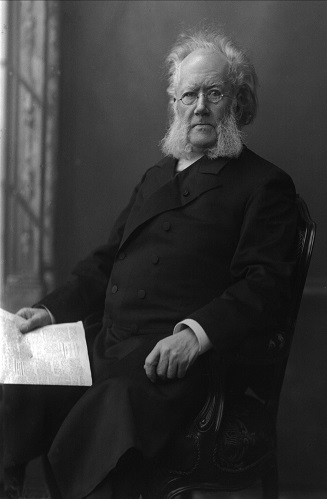
(Henrik Ibsen, author of ‘An Enemy Of The People’;
Image via Wikipedia)
Economic Imbalance
It was primarily the wealthy who caused this pandemic: from the wealthy Chinese minority driving its wildlife trade to the affluent international travellers who are the chief beneficiaries of globalisation and the industrialists routinely profiting from unjust privatised healthcare systems. The wealthy have survival cushions; COVID-19 won’t destroy them. So why can’t the wealthy foot the bill for this pandemic? The Indian government repudiated the IRS’s suggestion to increase the tax on the wealthy to compensate for forecast budget deficits, and sued the officials who dared venture this suggestion. But why?
Thomas, faced with unanimous opposition to his straightforward scientific discovery and his proposed solution, realises why. He understands that this affair of the Baths has exposed a deeper rot at the heart of society – that it is based on an inertial opposition to truth and progress. It’s led by demagogues who exploit the people’s basest urges, and conduct campaigns of active disinformation to turn the people against truth-speakers. Just as the government-industrial-news complex brands Thomas’s truth radical and antisocial, similarly, self-interested regimes discredit calls for justice and transparency in reality.
Our pandemic has exposed deep systemic flaws – which emerge clearly when we contrast the response of different nations. Italy and Spain were badly hit, but decisive government action, and public support, turned the tide.
In India and the U.S., the idea that every human is entitled to dignity, a stable job and living wage, and decent healthcare are still radical ideas. It’s no coincidence that these two countries have longstanding and high socioeconomic inequality. This is perhaps why their response to COVID-19 has been appalling.

(Migrants forced to walk home with no means on travel and livelihood;
Image via Scroll.in)
Politics And The (Un)Free Press
In Enemy, the media initially appears to side with the truth. The People’s Messenger, run by radicals, offers itself as Thomas’s platform against Peter. The journalists’ motives are, like Peter’s, political: they want to use the Baths affair to topple the town’s government. But the moment Peter declares that it’s the citizens who must foot the overhaul bill, these political radicals become economically conservative. Since they don’t want to pay, their readers won’t want to either; and, as a newspaper, they must give their readers what they want. The media aligns itself with the political-economic status quo, turning the people against Thomas by branding him ‘an enemy of the people.’
Free press exists to critique the government on the citizens’ behalf. But, across the world, the press has tragically aligned itself with the powerful. Though predating COVID-19, this liaison has further politicised the pandemic, to the detriment of the people. Weathering increasing unprofitability and other threats, journalism has, for decades, faced a dilemma: will the people pay for truth, or for entertainment? To hear what we need to hear, or to hear what we want to hear?
The fact is that we’ve become unwilling to pay for news. As a result, newspapers have gone one of two ways: sold out to billionaires and become corporate organs; or become sources of cheap entertainment.
–
An Enemy Of The People points at politicians and the media as allies in suppressing the truth, discrediting truth-speakers, and endangering – with denial and an unjust system – the lives and livelihoods of millions. Globally, the pandemic is generating talk of the need for systemic change – better healthcare systems, livelihood guarantees, government accountability, and citizens’ wellbeing over corporations’ profit.
Ibsen reminds us that systemic inertia is deep-rooted, that reformers face universal opposition, and that if we want progress, we must unite against unholy liaisons who will brand us as enemies of the people.

Amita Basu is a cognitive science PhD candidate. Her fiction has appeared or is forthcoming in Flash Fiction Magazine, Kelp, Fearsome Critters, The Bookends Review, Potato Soup Journal, Gasher, Star 82 Review, Proem, St. Katherine Review, Entropy, Muse India, Dove Tales, Novel Noctule, and The Right-Eyed Deer. Her nonfiction has appeared in The Curious Reader, Deccan Herald, Qrius, Countercurrents, and Parent Edge. She is working on a collection of literary short stories, and a mystery novel about art. She lives in Bangalore, India and blogs at amitabasu.com.
Read her posts here.

